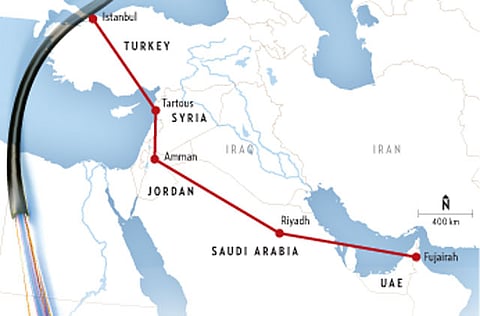Seven telecom operators join to build longest cable network
Fibre optic line will be operational in the second quarter next year

Dubai: Seven regional telecom operators said they are building the longest fully-redundant terrestrial communications infrastructure in the Middle East.
The, Regional Cable Network (RCN) will run along a 7,750km round trip route. A fully redundant network ensurse that your site will remain available even if one network's service is interrupted.
The RCN project brings together top telecom companies from five countries.
Etisalat (UAE), Mobily (Saudi Arabia), Jordan Telecom/Orange Jordan and Mada-Zain Partnership (Jordan), Syrian Telecommunications Establishment (Syria), and Superonline (Turkey) have signed up for the project. With an approximate investment value of $500 million (Dh1.83 billion), the fibre optic line will be operational in the second quarter of 2011.
"The RCN project will extend from the Fujairah to Istanbul in Turkey and then to Europe and will serve as a gateway to the internet for two billion people," a statement said.
Designed to offer connectivity to Europe through more than 15 access points readily available on the Bulgarian and Greek borders of Turkey, RCN infrastructure boasts of a data carrying capacity of 12.8 terabit per second.
Two different routes
Initially, a 2.4 terabit per second capacity will be activated along the two different routes.
In contrast to similar systems, all the operators taking part in RCN, will dedicate fibre on both routes exclusively to RCN, paving the way to immediately upgrade or re-route the entire path when needed.
Analysts say content generation is likely to be another area of increased activity and the project will play a strong role in communication in the region.
Lindsey McDonald, ICT analyst for the Middle East and North Africa at Frost and Sullivan, said: "The historic growth levels of the Mena [Middle East and North Africa] mobile market are unlikely to continue as most countries in the region are nearing maturity, but the region's fixed line market is expected to show high levels of growth as operators make increased investments in fibre and fibre to the home (FTTH)."
"The introduction of the latest submarine cable to connect the region to India and Europe has brought increased bandwidth and new opportunity for telecommunications services to the region," McDonald said.
The RCN project was signed during a ceremony held in Ankara.
Starting from Fujairah and passing through Riyadh (Saudi Arabia), Amman (Jordan), Tartous (Syria) and reaching Istanbul (Turkey), the RCN project's fibre optic cable line will cover the entire Gulf region in the Middle East for the first time through a uniform infrastructure.
"With 3,875km in radial length and totaling 7,750km with its round trip routes, the RCN project will become the region's longest fully-redundant terrestrial fibrer infrastructure between Fujairah, one of the busiest nodes for submarine and fibre cables, and the West," said a company spokesperson.
Consortium chairman and executive vice-president, etisalat, Ali Amiri, described the RCN as being unmatched in terms of speed, quality, ease of upgrade, redundancy, and reliability.
"The demand for intercontinental connectivity continues to grow at a remarkable rate. The region's governments are encouraging investment in new technologies to bolster the performance of their national economies," he said.
Increasing volume
"Operators are deploying Next- Generation Networks for both fixed-line and wireless environments which in turn allow an increasing volume of services to be provided to ever more consumers.
"These factors as well as the growing technical literacy of the local population and availability of rich local content are all driving the demand for ever more capacity. Etisalat is delighted to partner with six of the region's leading operators in a project which will enhance the lives and increase the reach of over two billion people," Amiri added.
Sign up for the Daily Briefing
Get the latest news and updates straight to your inbox



